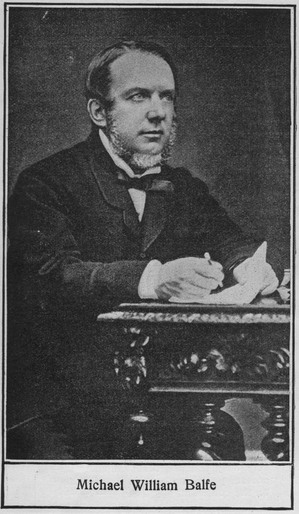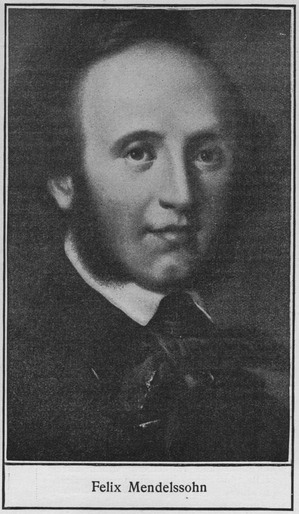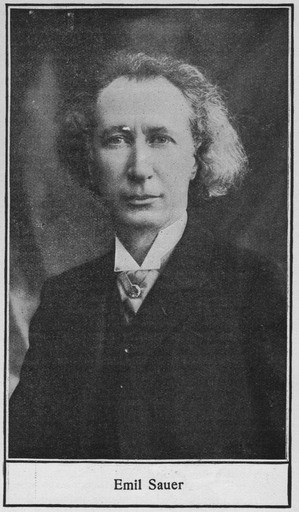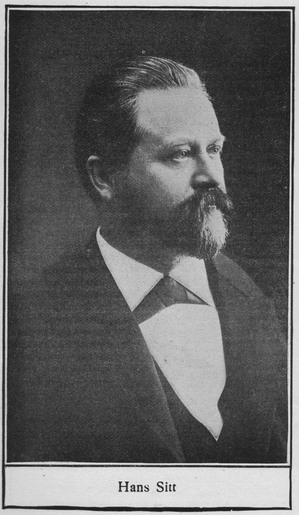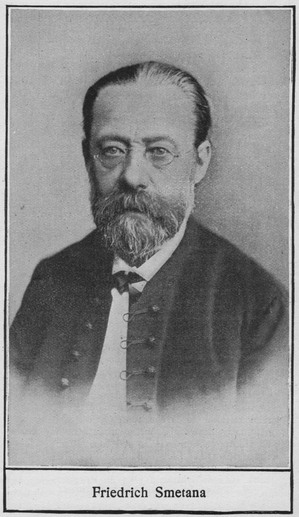Balfe was born at Dublin, May 15, 1808, and died October 20, 1870, at Rowney Abbey, Hertfordshire. His father was a dancing master, and young Balfe obtained his first musical experience as a violinist at his father's dancing classes. Subsequently he became a violinist at Drury Lane Theatre, London, 1824. The following year he visited Italy. He became first baritone at the Paris Italian Opera, 1828. While in Paris he was closely associated with Rossini. On account of ill-health, however, he was obliged to leave Paris, and he returned to Italy. He went to Palermo, and it was there he produced his first opera. In 1833 he returned to London, where he appeared at many concerts. The first of his many English operas was produced in 1835 at Drury Lane. It was called The Siege of Rochelle, and met with great success. Many others followed, but the most successful of all and the most popular was The Bohemian Girl, which was produced in London, November 27, 1843. This opera was translated into German, Italian and French, and was as popular on the continent as in England and America. In 1849 Balfe went to Berlin to produce some of his works. He achieved a great success, and became very famous. He spent a very busy life, and occupied many important positions, both in London and on the continent.
(Men'-del-sohn.)
Mendelssohn was born at Hamburg, February 3, 1809, and died at Leipsic, November 4, 1847. He was the son of Abraham Mendelssohn, a banker, and grandson of Moses Mendelssohn, a noted philosopher. He studied pianoforte under Berger, theory under Zelter and violin under Heunings. Mendelssohn made his pianistic début in Berlin, 1818. He first visited England, where he was a great favorite, in 1829; toured through Germany, Austria, Italy and France. He conducted various orchestras and choral societies, including the Lower Rhine Festival, 1833; Gewandhaus Orchestra, Leipsic, 1835, and the London Philharmonic, 1844. He founded the Leipsic Conservatory of Music; aroused people to appreciate Bach; wrote the greatest oratorios since Handel's, and exercised a profound influence on the musicians of his day. As a composer his oratorios, The Elijah, St. Paul, Hymn of Praise, etc., will always be appreciated, as will his orchestral works, such as The Midsummer Night's Dream incidental music, Fingal's Cave Overture, Scotch Symphony and the Violin Concerto in E Minor. The Songs Without Words are still much admired by pianists, and his songs by vocalists. His private life was above reproach, and all his life Mendelssohn dwelt and worked in an atmosphere of elegance and refinement which have fallen to the lot of few musical geniuses.
( Sour.)
Emil Sauer was born at Hamburg, October 8, 1862. He was a pupil of Nicolas Rubinstein at the Moscow Conservatory from 1876 to 1881, and was later a pupil of Liszt and Deppe. From 1882 he was engaged in various concert tours as a virtuoso pianist, in which he was highly successful. He appeared in England in 1894, and rapidly won the good opinion of the British public. He first came to America in 1898-9, and was at once accorded a hearty welcome, which has attended his subsequent visits to this country. In 1901 he was appointed head of one of the piano departments at the Vienna Conservatory, but resigned this position in 1907 to go to Dresden. Since then Sauer has again visited the United States and achieved pronounced success. As a composer he has written a symphony in E minor, a "suite moderne" and many smaller pieces for the piano. He is also the author of a book of reminiscences entitled Meine Welt. Grove's dictionary says that "his technic is wonderfully neat and accurate." This statement is more than borne out by those who have had the pleasure of hearing him play. Emil Sauer is a man of unusually wide intellectual attainments, and thoroughly deserves the eminent place he holds among the greatest living pianists.
Sitt was born at Prague, September 21, 1850. His father was a violin-manufacturer, and Hans first studied this instrument at the Conservatory of Prague. In 1867 he went to Breslau, where he became conductor of the theatre orchestra, later becoming Kapellmeister. Later he occupied a similar position in his native city. He left Prague to go to Chemnitz in 1873, but in 1880 became, for one year, conductor of the private orchestra of Baron von Derweis, at Nice. In 1881 Hans Sitt founded a series of popular concerts, and two years later he became teacher of the violin at the Leipsic Conservatory. It is in this capacity and in his capacity as a violinist that Hans Sitt is best known. As a teacher he is very popular, and possesses a remarkable gift for imparting knowledge. He has composed a great deal of music for his instruments, some of a technical nature, but also some very beautiful works of a more important character. These include three concertos for the violin, a viola concerto, a 'cello concerto, a symphony and many smaller violin pieces and clever songs. In addition to this, after going to Leipsic he became a member of the Brodsky Quartet, in which he played the viola. He also became conductor of the Bachverein and of the students' orchestra at the conservatory.
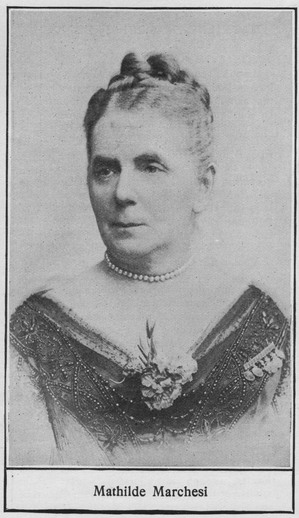 MATHILDE MARCHESI DE CASTRONE.
MATHILDE MARCHESI DE CASTRONE.
(Mahr-kay'-zee.)
Mme. Marchesi was born at Frankfort-on-Main, March 26, 1826. She was the daughter of a wealthy merchant. In consequence of her father's loss of fortune, however, she adopted the musical profession in 1843. She first studied singing with Nicolai in Vienna, but in 1845 she went to Paris, where she became a pupil of Garcia. Following this came success in London, and subsequently throughout Europe. In 1852 she married Salvatore Marchesi (her maiden name was Graumann), and two years later became professor of singing at Vienna Conservatory. She had great success here, but in 1861 she removed with her husband to Paris, where pupils came from far and wide. Four years later Mme. Marchesi became a professor at Cologne Conservatory, but resigned after another four years to resume her work at Vienna. She gave up this position in 1878, but continued for a time to reside in the Austrian capital. In 1881 she returned to Paris, and still resides in that city. As a teacher she has enjoyed most remarkable success. She has published a method of singing and twenty-four books of vocal exercises. Her most famous pupils, perhaps, are Mmes. Melba, Calvé and Eames, though many noted singers studied with her.
(Smeh-tah'-na.)
Smetana was born at Leitomischl, Bohemia, March 2, 1824, and died at Prague, May 12, 1884. He was a pupil of Proksch at Prague, and also, for a time, a pupil of Liszt. He achieved some distinction as a pianist, and opened a music school in Prague. In 1856 he accepted the directorship of the Philharmonic Society of Gothenburg, in Sweden. After the death of his wife, in 1860, he made a tour of Sweden, but the following year he returned to Prague. He was, in 1866, appointed conductor of the National Theatre in Prague. In the same year his most famous work, Die Verkaufte Braut (The Bartered Bride), was produced under his own direction at this institution. One of the members of his orchestra at that time, in whom he took a keen interest, was Antonin Dvorak. Smetana wrote many important works-operas, symphonic poems, orchestral pieces, chamber music and piano pieces. He must be reckoned among the national composers, his inspiration having been mainly founded on Bohemian ideas. Unlike that of Dvorak, it did not rapidly achieve a very wide appreciation outside his own country, but is gradually becoming better understood as time goes on. It is sad to record that towards the end of his life Smetana became deaf, and finally insane. He died in an asylum in Prague.


